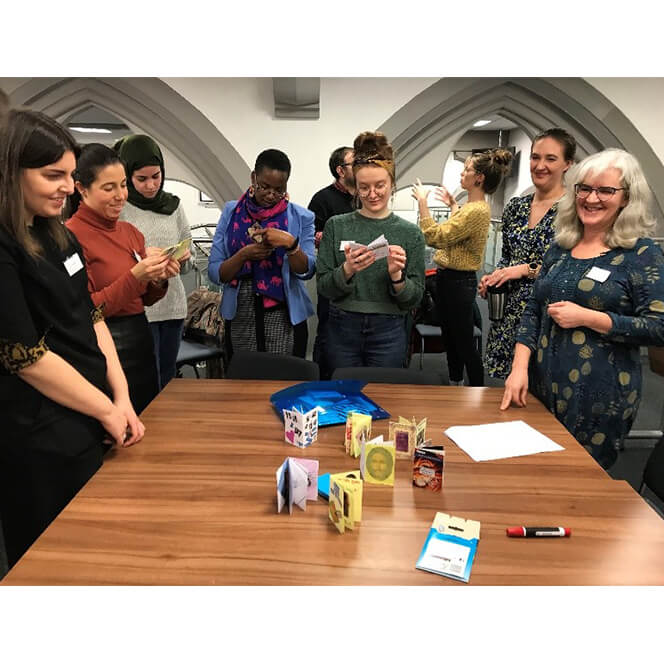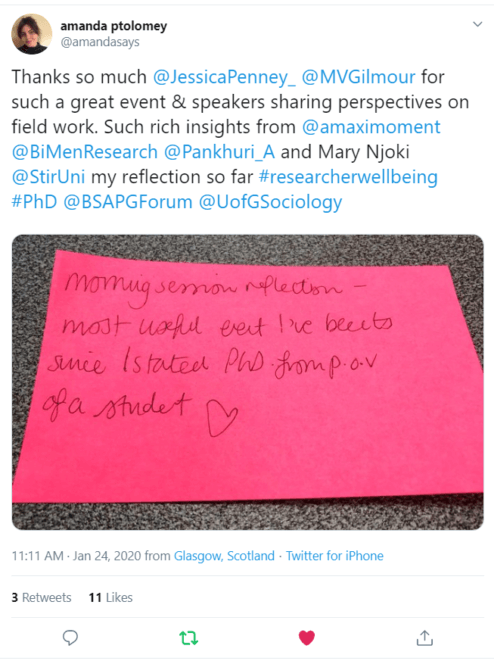University of Glasgow PhD candidates Molly Gilmour and Jessica Penney organized a British Sociological Association Postgraduate Event on Friday, 24 January from 9am to 5pm. Entitled ‘Facilitating Holistic Wellbeing in the Research Process’ the event brought together PhD researchers, academic staff and research support staff from across the UK. The day’s events were situated in the context of addressing both the opportunities and challenges that arise from lone fieldwork during research. This event facilitated a discussion from both the perspective of support staff and researchers about sociological research processes, which despite being a key aspect of postgraduate research, and an exciting time for many, can also be an isolating experience.
After a warm welcome from the event’s hosts and the head of the Sociology Department at the University of Glasgow, Dr. Matt Dawson, the attendees outlined their expectations for the day which included exploring how to create meaningful support networks during the research process, understanding our positionalities as a researcher, dynamics such as the ‘familiar stranger’ when working overseas, and how we can disentangle our expectations of ‘the field’, and of course it was space to share excitement and enthusiasm for those who are yet to begin data collection!
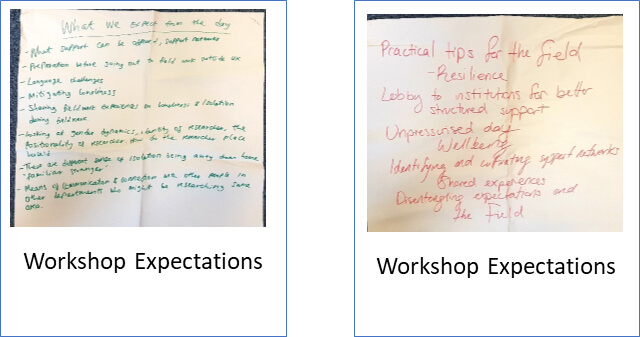
PhD Researcher Experience Panel
The first panel included four PhD researchers: Sam Lawton (University of Glasgow), Pankhuri Agarwal (University of Bristol), Alex Maxwell (University of Glasgow) and Mary Njoki (University of Stirling). These four participants reflected upon and shared their fieldwork experiences including fieldwork challenges and strategies used to overcome these.
The dynamics of gender in the field was a challenge faced by both Alex and Pankhuri in their fieldwork: Pankhuri’s fieldwork took place overseas from her home institution in Bristol, in her home country, India. Pankhuri reflected on the challenges that emerged from her positionality in her fieldwork as a young woman and the lack of respect and trust that this brought during her data collection. The gender dynamics for Alex also posed a challenge in the field, however the power balance shifted, as a white male who conducted his research in Uganda with female post-conflict returnees.
Questions from the panel included strategies of working with interpreters, which Mary could speak to from her experience of working with members of the BAME community who suffer from dementia. Another question from the panel focused on positionality as an ‘in-group’ researcher and how best to navigate and share your identity with research participants, due to fear of influencing the data through sharing experiences. This resonated with Sam, as he identifies as a member of the LGBTQ community and researched with other members of this community. He found that in his experience ‘honesty is the best policy’. The broad experiences and sociological interests from the panel created a dynamic discussion filled with advice for future researchers.
Support Services Roundtable
The second panel included four speakers who support researchers through the fieldwork process: Dr. Elizabeth Adams, Researcher Development Manager (University of Glasgow); Liz Brown, Membership Development Officer (British Sociological Society); Clara Voyvodic Casabo, PhD student and coordinator of the Oxford Fieldworkers’ Sessions (University of Oxford); Dr. Jo Ferrie, Senior Lecturer (University of Glasgow) and Deputy Director – Training (Scottish Graduate School of Social Sciences).
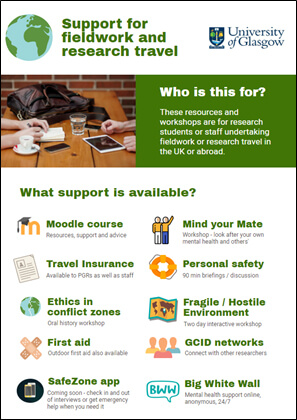 This panel spoke candidly about their experiences with fieldwork and experiences with supporting fellow researchers through fieldwork. This session provided researchers with examples of what support is offered and enabled participants to think ahead for what needs might arise in the field, and how to ask for support in meeting these needs. A dominating question in the room was ‘who has responsibility for PhD researcher wellbeing’? Jo Ferrie spoke passionately about how they believe that the most senior person in the room must share their candid experiences of research, including what can be deemed as ‘failures’ to ensure that we create a more supportive research environment. Jo also shared how we must realize the power that have to reshape research culture to create one which enables better wellbeing in the research process.
This panel spoke candidly about their experiences with fieldwork and experiences with supporting fellow researchers through fieldwork. This session provided researchers with examples of what support is offered and enabled participants to think ahead for what needs might arise in the field, and how to ask for support in meeting these needs. A dominating question in the room was ‘who has responsibility for PhD researcher wellbeing’? Jo Ferrie spoke passionately about how they believe that the most senior person in the room must share their candid experiences of research, including what can be deemed as ‘failures’ to ensure that we create a more supportive research environment. Jo also shared how we must realize the power that have to reshape research culture to create one which enables better wellbeing in the research process.
Elizabeth shared the support that is currently available at the University of Glasgow, as outlined in the infographic above. With the increase of overseas fieldwork in complex environment, encouraged by the Global Challenges Research Fund, more support is needed to enable researchers to undertake research in these environments in a safe and ethical manner. Clara explained the working group that she and a colleague created at the University of Oxford is an example of a student-led initiative to support one another and share resources and experiences.
One challenge that students often face in fieldwork is a lack of funding, for this Liz shared resources offered by the BSA including the BSA Support Fund, that can support students in overseas fieldwork, travel to events and thesis production.
Collaborative Zine Making Workshop with Amanda Ptolomey (University of Glasgow)
This Zine Making workshop created a supportive, creative, reflective and an incredibly enjoyable space for researchers and support staff to produce a zine that represents what wellbeing in the research process means to them. The zine making process offered an opportunity for researchers, who often rely on a rigid and fixed vocabulary to express their work, to find alternative way to express themselves. As many of us would identify as ‘perfectionists’ this proved a challenge! One met with a playful ‘crafternoon-ing’ getting sticky with pritt sticks and collaging with lefthanded scissors.
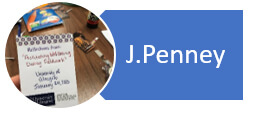


Follow the conversation @ #researcherwellbeing
Support Network Envisioning with Dr. Christopher Bunn (University of Glasgow)
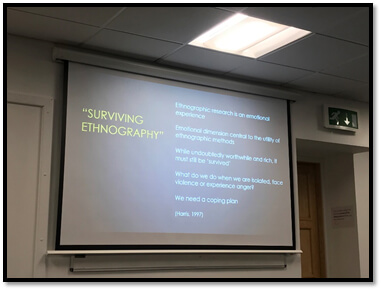
The last formal session of the day was a support network activity facilitated by Dr. Chris Bunn, a Fellow in the University of Glasgow’s Institute of Health and Wellbeing. This was a helpful reflective practice, during which we were encouraged to think about the people around us and how various relationships can be supportive (or not) in meeting our fieldwork goals. We worked in small groups to answer questions about our worries, challenges, and considered strategies we can employ during fieldwork. This session allowed us to think about how we would put into practice the concepts we had discussed throughout the day.
Conclusion: Looking Forward
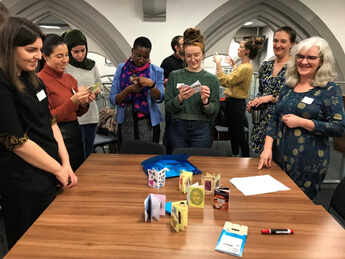
Overall, this event was an opportunity to meet other students and support service providers who are passionate about research and fieldwork, as well as addressing the unique challenges and benefits that come along with these experiences. It was a dialogic, encouraging environment and generated a network among attendees with both similar and dissimilar research interests. Despite some challenging discussions about mental health and support gaps, it was a positive, solutions-oriented space. During a final reflection session, we decided that we did not want the conversation to end after only one day. In order to keep the network going, we will be staying in touch via online platforms, including the Twitter hashtag, #researcherwellbeing. Feel free to join in on the conversation!
We would like to sincerely thank the BSA and University of Glasgow Sociology subject area for their support in funding and planning this event.
Molly Gilmour and Jessica Penney are postgraduate research students at the University of Glasgow.
